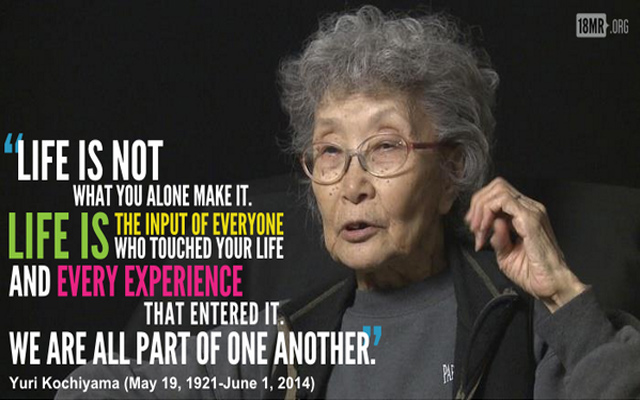Yuri Kochiyama: May 19, 1921 – June 1, 2014
June 3, 2014 Leave a commentMonday at our staff meeting Maanav Thakore called attention to Yuri Kochiyama’s passing. This post is a compilation of articles and media that honor her life and legacy.

From Knowledge, Generosity, and Yuri Kochiyama by Sean Miura in Hyphen Magazine
“It is with great generosity that Yuri shared her life and her stories, raising scores of organizers, activists, thinkers, and writers. Today this indomitable spirit still burns in her work, her mentees, and her family — who continue in the revolutionary resistance she embodied. We will still fight for freedom in our government and society, in the way Yuri fought to achieve a more just and free-thinking world.
With each generation the conversation changes, but the spirit of these mentors, thinkers, and elders persists. There is so much more learning, so much more sharing to be done.
Our thoughts are with the Kochiyama family, Yuri’s close community, and those who carry her legacy ever forward.
Rest, rise, and revolutionize in power.”
More at Hyphen Magazine
On Monday, June 2, Jamilah King at Colorlines wrote:
“Pioneering Japanese-American activist Yuri Kochiyama passed away on Sunday night. She was 93 years old. For some, she’s known as the woman who cradled Malcolm X as he lay dying on stage at the Audubon Ballroom in 1965 (“I just picked up his head and put it in my lap,” she recounted in a 2008 interview with Democracy Now! “I said, “Please, Malcolm! Please, Malcolm! Stay alive!”). But even that iconic image of her doesn’t do enough to capture the life she spent dedicated to social activism.
Kochiyama’s journey began with her family’s internment during World War II and wound its way through the Black Power and Black Arts Movements of the 1970s. She was instrumental in helping Japanese-Americans win reparations for their internment, and spent the last years of her life inspiring countless young activists.”
Arturo R. García elaborates in Racialicious:
…following the implementation of Executive Order 9066, Kochiyama and her family were among the 120,000 U.S. residents of Japanese descent “evacuated” to internment camps — specifically, Camp Jerome in Arkansas. Her granddaughter, Maya Kochiyama, detailed life in the camp for Discover Nikkei in 2010:
Amidst this isolation and unwavering uncertainty of release, though they lived in dingy, cramped barracks, the Japanese Americans tried to make the most out of their situation and made furniture from what pieces of wood lied around, planted flowers to brighten up the landscape, and sewed bed sheets, tablecloths, and curtains to improve what little privacy they had.
Yuri said that, “we learned soon enough that our strongest weapons to sustain ourselves were teamwork, a cooperative spirit, ingenuity, and concern for others.”
One of the things that came out of this camp experience for Yuri was that she began to learn more about her Japanese American community and identify herself as Japanese American. “I feel like going to camp actually is where for the first time I came to know my own people … I was really proud to be Japanese.”
What Yuri felt echoed many of the same thoughts as other second generation Japanese Americans who had grown up “All-American” and did not identify themselves with their Japanese heritage. Feeling betrayed by their country, some Nisei started to learn more about their Japanese culture and embrace their Japanese identity, even opting to “return” to Japan, a country that they had never even seen.
In the middle of incarceration and war, Yuri found her silver lining when she met a handsome, charismatic Nisei soldier, the love of her life and husband to be, Bill Kochiyama. At the time, a member of the all-Japanese American combat team, the 442nd Regiment, Bill was training at Camp Shelby, Mississippi, but soon shipped overseas to fight in Europe.
The couple wed in 1946, after the end of both the war and her family’s internment, and moved to New York City. But decades later, the Kochiyamas were part of the public push that led to the signing of the Civil Liberties Act of 1988 — a public apology from the U.S. government for the camps, and restitution in the form of $20,000 apiece for each surviving camp resident.

